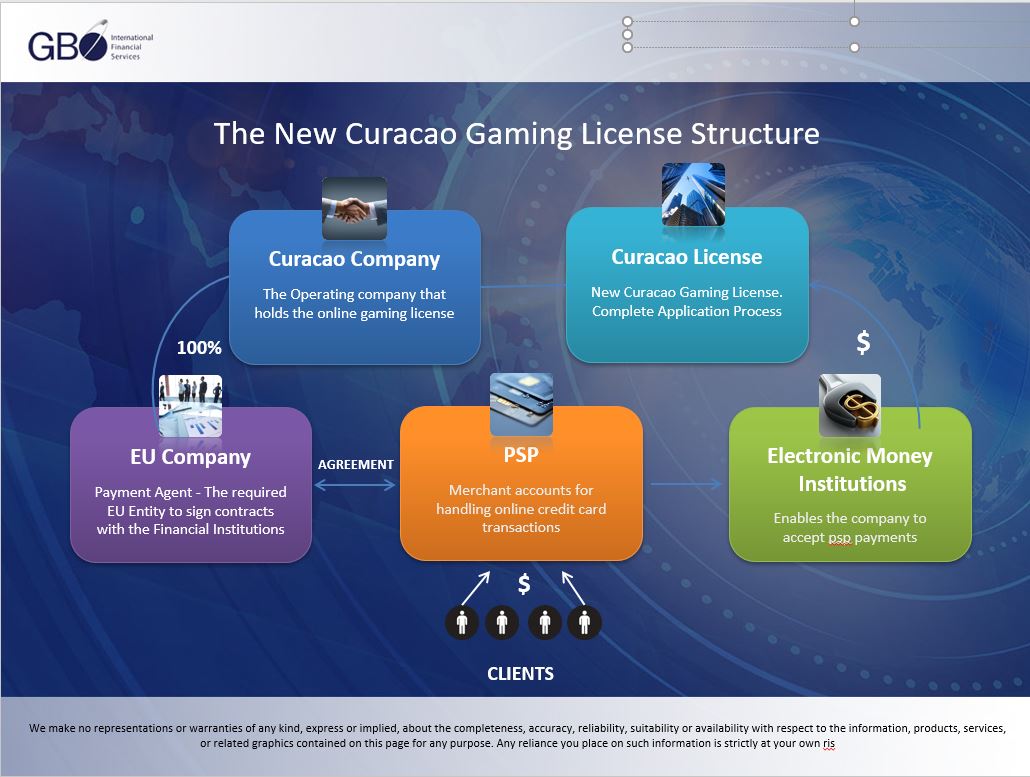Initial license Costs and Annual Fees
- New Curacao Gaming License (Annual): The license costs 120,000 ANG (approximately 61,700 EUR) and has a renewal fee of the same amount each year. It covers the full range of Curaçao gaming activities without extra fees.
- LOK Rules (B2C and B2B Business): Under the new LOK rules, B2C and B2B businesses are subject to an annual fee of €24,600. However, B2C businesses also incur a monthly fee of €2,050, while B2B businesses do not have any monthly fees.
- Annual Maintenance and GCB Fees: In addition to the initial licensing cost, there’s a yearly maintenance fee of €8,900, and the Curacao Gaming Commission Board (GCB) charges a significant fee of approximately €117,482 (around €60,000), which is also the cost for the second-year license renewal.
Additional Costs and Total Expense Overview
- License Application Process: It ranges from €8,500 to €21,000, depending on the specific requirements and services used during application.
- Optional Services: Depending on your operation’s needs, optional services can range from €5,000 to €15,000.
- Comprehensive Total Costs: Including incorporation, annual fees, GCB charges for two years, application processing, and optional services, the total expenditure ranges from €70,000 to €90,000.
Reflecting on the Past: Master vs. Sub-License in Curacao Gaming Licensing
In Curacao’s gaming licensing history, the distinction between a Master License and a Sub-License was pivotal for entities entering the online gambling space. This retrospective review sheds light on the differences that once defined these two types of licenses:
Historical Overview of Licensing Types
Issuance Authority:
- Master License: Previously, the Government of Curacao directly issued Master Licenses, which gave holders broad authority over online gambling activities
- Sub-License: Sub-Licenses were granted not by the government but by holders of a Master License, creating a tiered licensing structure.
Scope of Operations:
- Master License: Holders were empowered to conduct online gambling activities and had the authority to issue Sub-Licenses to third parties.
- Sub-License: This allowed for the operation of online gambling activities but did not permit the licensee to issue further licenses.
Validity Period:
- Master License: Offered an indefinite validity period, ensuring long-term operational stability for the holder.
- Sub-License: Generally came with a shorter validity, requiring periodic renewals.
Regulatory and Compliance Obligations:
- Master License: Faced more rigorous regulations and ensured all legal requirements were met, including the oversight of Anti-Money Laundering (AML) and Counter-Terrorist Financing (CTF) policies.
- Sub-License: This is needed to adhere to the conditions set by the Master License holder, focusing on implementing Know Your Customer (KYC) solutions.
Key Historical Insights
- Flexibility and Control: The Master License previously offered unparalleled flexibility and control, allowing holders to expand their operations significantly by issuing Sub-Licenses. This was an ideal scenario for entities aiming for a wider reach within the online gambling market.
- Direct vs. Indirect Regulation: The Government of Curacao directly regulated master license holders, including overseeing their Sub-Licensees. This direct oversight was crucial in maintaining high operational standards.
- Operational and Financial Considerations: Although the Master License offered greater freedom and the advantage of indefinite validity, it also imposed more substantial regulatory and financial obligations on the holder. In contrast, a Sub-Licence provided a more accessible option for businesses seeking entry into the market without the complexities of issuing or managing additional licenses.
Understanding these historical distinctions was once essential for making informed decisions in the online gambling sector. Today, with the consolidation into a single Master License framework, the landscape has simplified, but the lessons from the past continue to inform the present and future of gaming regulation.
Challenges and Considerations
Knowing the territory’s challenges and considerations is essential when obtaining a Curacao gaming license. These can range from regulatory hurdles to operational requirements, each crucial to successfully establishing and maintaining your online gaming business.
Regulatory and Compliance Challenges:
- Administrative Challenge: Adhering to the comprehensive policies and procedures needed for compliance can be daunting. This includes establishing fair, solid play, anti-fraud, and responsible gaming systems requiring significant time and resource investment.
- Technological Integration: Keeping systems up-to-date with the latest regulatory standards is critical. This involves initial setup and ongoing adjustments to meet new regulatory requirements.
- Data Protection and Privacy: Implementing rigorous data security protocols is non-negotiable, ensuring that player information is kept safe and confidential.
Operational Considerations:
- Banking Access: Banks’ reluctance to open accounts for Curacao casinos presents a significant hurdle. This is often due to the industry’s high risk and Curacao 25’s offshore jurisdiction status.
- Merchant Account Challenges: Obtaining merchant accounts is complicated by financial institutions’ need for knowledge about the online gaming industry and its perceived risks.
Reputation and Market Positioning:
- Reputation: There are concerns about the reputation of Curacao gaming licenses due to perceived weak licensing standards and lack of oversight. This can impact your ability to attract players and partners.
- Market Adaptability: Staying competitive in a rapidly changing market is essential. This requires keeping up with industry trends and adapting to the new regulatory landscape.
Player Relations and Legal Requirements:
- Player Dispute Resolution: The absence of a formal mechanism in Curacao to help players resolve disputes with casinos can lead to issues with unpaid winnings, affecting player trust and business reputation.
- Residency Requirement: At least one of the company’s founders must reside in the Netherlands Antilles, adding a layer of complexity for international businesses.
- Server Location: The requirement that the company’s physical servers be located in Curacao is another operational hurdle that requires careful planning and execution.
Navigating these challenges and considerations is critical to establishing a successful online gaming operation in Curacao. It requires a strategic approach, careful planning, and ongoing vigilance to ensure compliance, maintain a competitive edge, and build a reputable and trustworthy gaming platform.
Strategic Business Setup in Curacao
Setting up a strategic business in Curacao for online gambling involves understanding the regulatory environment, the licensing process, and the jurisdiction’s benefits. Here are key points to consider:
Understanding Curacao’s Regulatory Environment
- Curacao Gambling Control Board (GCB): The GCB is Curacao’s primary body regulating gambling. Its responsibilities include licensing, supervision, enforcement, promoting responsible gaming, and combating money laundering and terrorist financing.
- One License for All: The Curacao gaming license covers all iGaming-related activities under a single license. This flexibility is advantageous for gaming companies looking to diversify their portfolio.
- Quick Licensing Process: From initial contact to approval, obtaining a Curacao gambling license takes six weeks or less, making it an efficient choice for businesses.
Financial and Operational Advantages
- Business-Friendly Tax Rates: Curacao is known for its business-friendly tax rates, offering significant financial advantages to companies.
- Modern Infrastructure: With its modern infrastructure, Curacao is an ideal offshore business hub, supporting the operational needs of online gambling companies.
Strategic Business Setup Solutions
- Service Packages: Curacao offers different service packages for registering a Gambling License, including Extended, Most Popular, and Basic. These packages cater to businesses’ varying needs and budgets.
- Potential Solutions for Challenges: To navigate banking and financial service challenges, creating a structured infrastructure combining a local Curacao e-gaming company with a merchant account in the European Union (EU) can be a strategic approach. This setup helps overcome the hurdles related to banking access and merchant account challenges.
Businesses can establish successful online gambling operations by leveraging Curacao’s regulatory environment, financial benefits, and strategic solutions. Choosing the right service package and considering innovative solutions to common industry challenges is crucial.
Enhancing Your Online Casino
Enhancing your online casino to attract and retain players involves a strategic approach that leverages the comprehensive coverage of the Curacao gaming license and employs effective player engagement techniques. Here are actionable strategies:
Diverse Gaming Portfolio
- Variety is Key: The Curacao gaming license covers all game types, including online casinos, slot machines, sports betting, cyber sports, and lotteries. Diversifying your gaming offerings can attract a broad audience.
- Mobile Optimization: Mobile devices account for most of the global internet traffic, so ensuring your online casino is mobile-friendly is crucial to cater to the rising number of mobile users.
- Localization: Implement localization strategies to tailor your offerings to specific markets, showing care and understanding for your target audience.
Player Engagement and Retention
- Bonuses and Promotions:
- Utilize bonuses and promotions wisely to increase players’ bankrolls and chances of winning. Ensure clear communication of terms and conditions.
- Offer frequent matching or no-deposit bonuses to keep players engaged and incentivized.
- Gamification: Employ techniques to motivate participation, increase engagement, and foster loyalty. This could include leaderboards, achievement badges, and reward systems.
Responsible and Fair Gaming
- Fair Play Certification: Achieve certification by eCORGA and ICG and use a trusted Random Number Generator (RNG) to ensure game fairness and integrity.
- Responsible Gambling Tools: To promote responsible gambling, implement deposit limits, session time limits, win/loss limits, and spending limits. Encourage players to practice good gambling habits, like budgeting and setting limits for each game.
- Robust Security: Establish a vital infrastructure to protect user accounts and personal information, which is essential in winning players’ trust.
- Customer Support: Provide excellent customer support, especially for international players across different time zones, to address any concerns or issues promptly.
These strategies can enhance your online casino’s appeal and ensure a satisfying and secure player experience. This approach aligns with the operational flexibility offered by the Curacao gaming license and positions your platform for long-term success in the competitive iGaming industry.
Conclusion
Navigating the intricacies of obtaining a Curacao gaming license entails a comprehensive understanding of the regulatory environment, financial obligations, and strategic operational considerations. This guide has delineated the critical steps in the licensing process and the advantages of holding a Curacao license, including operational flexibility, economic benefits, and the wide-reaching implications of recent regulatory changes. Moreover, it emphasized the importance of distinguishing between a Master and a Sub-License, underscoring the strategic benefits and responsibilities associated with each, to equip prospective licensees with the necessary insights for making informed decisions that align with their business aspirations.
As the online gaming landscape continues to evolve, the significance of adapting to regulatory changes, understanding the financial framework, and executing a strategic business setup in Curacao cannot be underestimated. This approach ensures compliance and operational efficiency and positions businesses for sustainable success in the competitive iGaming industry. With the Curacao gaming license offering economic advantages, operational flexibility, and global reach, it stands as a strategic choice for businesses looking to establish or expand their footprint in the online gambling sector.
Curacao Application Process and Requirements:
New applicants must register on the portal and complete all required digital paperwork, including the Online Gaming License Application, Corporate and Business Information Form, and Personal History Disclosure Form. These forms are necessary for members of the Board of Directors, managing directors owning more than 10% of stakeholders, and key individuals like the CEO or Compliance Officer. Digital signatures might be needed, with recommended use of programs like Acrobat Reader or Acrobat Pro.
Curacao’s New Licensing Authority and Goals:
The responsibility of issuing licenses for online games of chance targeting the international market under the National Ordinance on Offshore Games of Hazard (NOOGH) shifted from the Governor of Curaçao to the Minister of Finance and, by 2020, to the Curaçao Gaming Control Board (GCB). The licensing aims to prevent fraud, protect players including minors, and prevent gambling addiction by ensuring safe, responsible, transparent, and reliable gaming services.
Evaluation and License Issuance:
Legal entities registered under Curaçao law involved in player and funds management are eligible for a license. The GCB evaluates applicants based on integrity, financial integrity, and accessibility of delivery channels. Successful applicants must submit specific policies and procedures to the GCB within six months.
Operational and Compliance Details:
The portal process includes submitting applications and documents through the official website, with the GCB making decisions within two months. Licenses are valid for one year and come with conditions to ensure compliance, including fees determined by national decree. Licensees must adhere to strict safety, security, and operational standards, including player onboarding, financial transactions, game certification, and grievance handling. Regular record-keeping and reporting to the GCB are mandatory, with potential for license revocation upon non-compliance.
Additionally, the website portal.gamingcontrolcuracao.org is noted for its modern design, comprehensive and well-researched content, quick load times, and secure, user-friendly experience, further facilitating the application and compliance process for prospective licensees
FAQs
What is the cost of obtaining a Curacao gambling license?
Around 70000 USD for the new license but the cost of acquiring a gambling license in Curacao can vary. To estimate the total fees accurately, consult a licensing expert or the official Curacao eGaming authority.
From which countries can players gamble on a Curacao online gaming casino?
A Curacao gambling license lets you serve players globally, except where restricted by Curacao’s laws. Many other countries prohibit access from their own country to foreign online gaming sites, mainly to protect their own local gaming operators. These include Georgia, Sri Lanka, Austria, Belgium, Bulgaria, Croatia, Denmark, Estonia, Finland, France, Germany, Italy, Poland, Romania, Spain, UK, USA and Panama.
Can I trust the legitimacy of a Curacao gaming license?
Yes, a Curacao gaming license is legitimate. Established in 1996, Curacao was the pioneer in offering a gaming license for online gambling businesses. This license permits holders to legally operate online gambling, poker, casinos, sports betting, and lotteries.
Which country offers the most straightforward process for obtaining a gaming license?
Curacao provides the most straightforward process for obtaining a gaming license, encompassing all gaming activities. A Curacao license is a mark of customer respect and trust. Some services offer ready-made solutions for acquiring a gaming license in Curacao.
From which countries can players gamble on a Curacao online gaming casino?
It is essential to recognize that players are wary of unlicensed casinos, or those operating out of countries that do not enforce the security standards accepted by others. This is what makes Curacao such a desirable location for your casino operation. It has one of the best reputations in the world, and your license is your gateway to the gambling market.
The Curacao Gaming Board has set the terms of how license holders can operate. The only specific restrictions that are placed on license holders are that it cannot accept wagers from players located in the following jurisdictions:
- The US
- France
- Australia
- The Kingdom of the Netherlands
- Curacao
- Dutch West Indies
These are the only countries where casinos with a Curacao Gaming License are forbidden from permitting players to wager. However, the board does not oversee this. Online casinos must use the standard KYC, AML, and CFT, which apply to all registered online casinos worldwide.
It is not the responsibility of the Curacao license holder to detect that players are registering themselves from blocked countries and accessing the website illegally.
Other countries or jurisdictions may have legislated restrictions on gaming. These restrictions apply not only to Curacao but also to casinos worldwide. Some other countries have blocked or restricted online gambling.
These fall into a few broad categories:
Banned
Gaming is banned in North Korea, Singapore, Qatar, Cyprus, Brunei, UAE, Cambodia, Japan, and other Middle Eastern kingdoms. This restriction does not explicitly apply to Curacao casinos but applies to gambling on any online website based in any country.
Curacao Restricted countries
Many countries restrict online gambling to either their state-owned monopolies (for example, Poland, Ethiopia) or to casinos that are licensed by that country’s gaming authority (such as Austria, Belgium, Georgia, Bulgaria, Croatia, Sri Lanka, Denmark, Estonia, Finland, France, Germany, Italy, Netherlands, Romania, Spain and the UK.) This is so the country can collect the appropriate gaming levies on wagers and corporate taxes on the license companies.
Limited
Several countries forbid gambling on websites run by casino operators based inside that country. Still, citizens can gamble on casinos in other countries, such as Curacao. Examples include Canada, most of the EU members, and Switzerland.
Open
In most of the remainder of the world’s jurisdictions, its citizens can access and gamble on a foreign casino without restrictions. In most of them, the government has not established controls that define or restrict online gaming. Most of sub-Saharan Africa and India are unregulated regarding what kind of online gambling is permitted.









